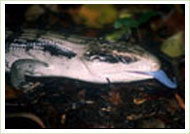Blue tongue rescue
Wednesday, December 8, 2010
This rescue story is by one of our dedicated WIRES volunteers.
Early this Spring, I was called out on a rescue for a Blue Tongue that was not moving. I happen to be very fond of Blue Tongue Lizards and was worried as this was in a populated area.
When I arrived, a lovely woman from the UK took me to her back garden. She told me that she had first noticed the Blue Tongue that morning, lying on a rock in the sun, in the middle of her garden.
She was worried when a few hours later he was still there so she moved him to the shade under a bush and phoned WIRES.
I was able to examine him and realised quickly that he had a full belly. I explained to the member of public that he had probably been in semi hibernation, explained about thermo-regulation and showed her where his belly was full and told her I suspected he had gotten a nice mouse and had it for breakfast and was on the rock, sunning himself and digesting his morning tea.
She was still concerned and I asked her if she had fears of a Blue Tongue in her yard. She stated that she really liked the fact that her garden had attracted one and was simply worried as he was not moving around. As she had no fears other than for the safety and wellbeing of the lizard, I told her I would take him into observation overnight and would drop by the next day with news.
I took this lovely blue tongue home, offered him some water with a syringe, which he drank, and put a warm water bottle in his cage. He immediately laid on the bottle as he obviously had more digesting to work on. The next morning he was much more active and ready to go back home. I returned to the yard he came from and again spoke to the member of public about the eating, digesting and habits of a blue tongue in one's yard. By the time I left, she had given him a lovely name and agreed not to feed him as he would keep her garden free of insects and small vermin if left to fend for himself.
This was a very good outcome as the Blue Tongue was not harmed in any way, only spent a night under observation, and the member of public learnt about the volunteer activities that we do as WIRES members.

Recent Posts
WIRES launches its first wildlife rehabilitation centre - Mullyang
WIRES Emergency Response in the wake of ex-tropical cyclone Alfred
International Women’s Day Volunteer Spotlight: Shelley
Tropical Cyclone Alfred – Emergency Wildlife Advice
Interview with WIRES Training and Development
Celebrating Women in Science: The Journey of Holly, Wildlife Conservationist and WIRES Team Member
